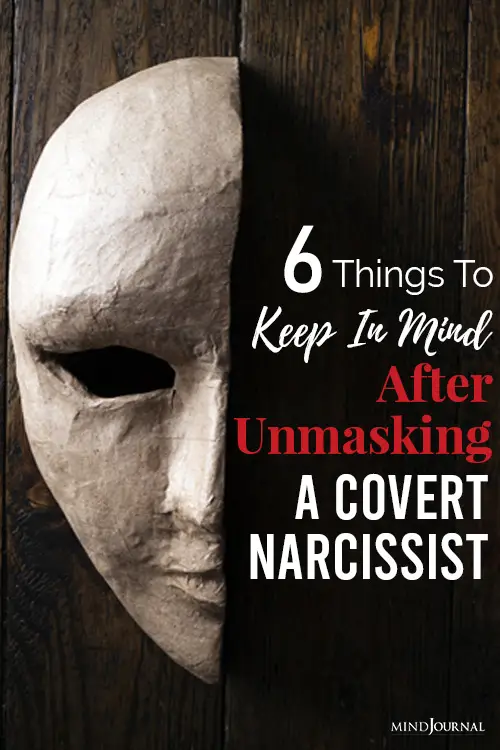Covert narcissists are the worst type of narcissists. They thrive by pretending to be something they are not. They pretend to be altruistic, kind, and codependent. Covert narcissists get what they need out of life by creating a false self. Simultaneously, they hurt people in their most intimate relationships by behaving pathologically narcissistic behind the scenes.
But what should YOU do if you have found yourself in a relationship with a covert narcissist?
Naturally, coming to this awareness is disturbing, because who you thought you loved, the kind, benevolent, giving person, is far from reality. We all want to believe that the person with who we were in a relationship with really cares about us and that their empathy is real. When that facade comes crumbling down, it leaves us with a gaping hole.
Related: What Is A Covert Narcissist?
What happened to us? How could we have been so foolish?
If you have unmasked a covert narcissist and find yourself asking these questions, consider the following.
Here Are 6 Things You Should Keep In Mind After Unmasking A Covert Narcissist
1. Be gentle with yourself.
If you are a victim of a covert narcissist, please remember to not be so hard on yourself.
Their treatment of you is nothing personal. Narcissists thrive on being able to fool and deceive anyone they encounter. Not because they are sociopaths or liars, but because they cannot get what they want if the world knows who they are.
So, do not beat yourself up.
Narcissists thrive and survive on bad self-esteem, so the worst thing you can do when you uncover a covert narcissist is beat yourself up. You are just one of many victims they have preyed upon.
2. Stay calm.
Once you realize you are just one of many to suffer at the hands of this narcissist, simply calm down. It is normal to feel overwhelmed when you unmask a covert narcissist. But an emotional reaction, especially a public one, will only make you look bad.
A narcissist has everything to gain by making you look, irrational, mentally ill, or foolish. Or just to intimidate you and berate you until you recoil and admit that you were wrong.
So, do not call out your narcissist. There is too much at stake for them to lose their audience, group of people, job, or other supply.
3. Create an exit strategy.
Not surprisingly, once you discover that your loved one is a covert narcissist, you will want to find a way out of the relationship.
With a narcissist, however, you will not be able to simply terminate the relationship and walk away. You will have to develop an exit strategy. Your exit strategy will require you to avoid an obvious confrontation.
You will have to carefully think it through and carefully execute it, for you to be successful.
If the covert narcissist discovers your exit plan – to terminate the relationship, to break up the relationship, to seek your divorce – they have too much to lose not to discredit you and turn it around back to you.
Related: The Covert Narcissist: Angel On The Outside, Devil On The Inside
4. Build a boundary of protection.
As you begin to execute your exit strategy, the next step is to create a boundary of protection around you.
Remember we do not do well at holding our ground and setting boundaries with manipulative narcissists. When we decide to create an exit plan and move on with our lives, the covert narcissist will automatically become nervous and try to derail your plan.
They are smart enough to know that if you are not part of their followers, the audience that loves them, and you back off, get cold, or establish even the most minor boundaries, they are going to know something is wrong.
If the signals are there, they will work hard to turn the situation around on you and make you look like the bad guy to restore their covert narcissist façade.
5. Be aware of passive-aggressive attacks.
Another important thing to keep in mind is the passive-aggressive nature of narcissists. The nature of the beast, when you uncover a covert narcissist, is that they will find out.
They have legions of loyal followers who believe in their portrayed image of perfection and kindness. They will be able to get their followers to understand what is wrong with you. In a way, we call this projection. You are the threat who knows exactly who they are and have the power to expose them. They have everything to gain by making you look bad.
Because they are covert narcissists, they do not do anything directly, there is no direct aggression, no direct confrontation. It is a passive-aggressive reaction; retaliation is almost always manipulative. They are going to fight you behind the scenes, in a way that protects their image.
For example, they will set you up to look bad, they will antagonize you in a way that gets you to defend yourself, to attack them. They will even try to gaslight you into thinking you are mentally ill!
Even some not-so-healthy psychotherapists use this technique to make themselves appear superior to you, even trying to use dysfunctional analysis or technical terminology to protect themselves. Eventually, they suggest you are the problem, not them.
Awareness of this narcissistic technique will help you avoid becoming a victim.

6. Never take on a covert narcissist head-to-head.
Finally, when dealing with a covert narcissist, it is important to understand the degree of danger involved.
Every time I have called out a covert narcissist – famous YouTube person, psychologist, therapist, boss, or friend – it has always been an uphill battle to not only survive but to get out of it unscathed.
I must admit that I made a lot of mistakes, doing it the wrong way. I assumed my intellect or ability to argue a point could be as good as theirs and take them on directly.
In almost every case it resulted in a long extended argument, whether it was through email or face-to-face. Ultimately in almost every one of the cases, I would find out behind the scenes how much time, energy and even money the covert narcissist expended, to not only dismiss my claims but to make me look like the bad person, ultimately resurrecting their image and their reputation.
So do not take on a covert narcissist directly. They have everything to gain by making you look bad.
Related: 5 Emotional Manipulation Tactics Covert Narcissists Use To Trap You In A Relationship
Their whole life story is about the manipulation of others, their perceptions, feelings, and expectations, and to manipulate others into believing they are something they are not.
No matter how right you are and feel, there is a good probability you are going to lose.
So cut your losses, identify their covert narcissism, come up with an exit plan, initiate it or execute it quietly, without a lot of confrontation, be prepared for a passive-aggressive battle that makes them look like the victim, and you the perpetrator, and get out of the relationship.
Do not argue with them, do not go on a public forum, do not try to prove your point. Because to do so is like wrestling with a pig and hoping you will not get dirty. It’s like George Bernard Shaw said, – “I learned long ago, never to wrestle with a pig. You get dirty, and besides, the pig likes it”.
Ultimately to achieve self-love, which is the goal of every codependent, or person with Self-Love Deficit Disorder, you have to get out of the relationship and find a space where you can find yourself.
You must nurture yourself, love yourself, and reconnect with others.
Find a way to heal the wounds, to love yourself, to reconnect with yourself, and to what is important to you and what you deserve. Then better relationships will happen and you will never again be subjected to a covert narcissist.
And if one should come your way, you will see their mask before they have an opportunity to hurt you.
Ross Rosenberg M.Ed., LCPC, CADC, is the owner of Self-Love Recovery Institute. He is a psychotherapist, educator, expert witness, and author. Ross is known globally for his expertise in codependency (Self-Love Deficit Disorder™), Pathological Narcissism, Narcissistic Abuse, and Trauma Treatment. He is a keynote speaker and educator who has presented in 30 States/70 cities and abroad. Ross has been regularly featured on national TV and radio. His “The Human Magnet Syndrome” books sold over 120K copies and are translated into 10 languages. His YouTube Channel has amassed 19 million video views and over 200K subscribers.
Written By Ross Rosenberg Originally Appeared In Human Magnet Syndrome










Leave a Reply
You must be logged in to post a comment.